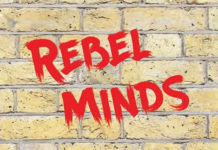I Used to Be Psychotic and Then I Heard a Voice Again
When I heard a voice speak to me last week, I was experiencing a response to significant events — the voice was a way for my mind to intentionally contain a confusing personal event or experience. As a professional, I am grateful for the powerful reminder that hearing voices is something to embrace and support, which includes putting aside my own prejudices.
A Positive Understanding of How Our Minds Work
Often it is a relief to get an understanding of how we have developed a psychological problem, and it is especially good if we can feel that there is a reason for the problem that it is understandable. When I suffered from a phobia, it was a relief to understand that I probably had linked fear to an insect when I was a child. And it was even more satisfying when I understood that there was nothing wrong with my brain — that the problem was in what I had experienced. It was in my “software.”
Malcharist: Fact or Fiction? Big Pharma, Psychiatry’s Key Opinion Leaders and their Ghostwriters
Malcharist, by Paul John Scott, is a fictional account of one of psychiatry’s most influential key opinion leaders (KOLs), his ghostwriter, and a journalist on the trail of a big scandal in the world of Big Pharma.
Future of Mental Health Interview Series: Interview with Joanna Moncrieff on The Myth of...
The Future of Mental Health interview series continued this past week with many interesting interviews: Claudia Gold on The Silenced Child; Bill D. on Alcoholics Anonymous; Jackee Holder on Life Coaching and Emotional Health; Rorie Hutter on Innisfree Village; Lori Sylvester on residential treatment for adolescent girls; Joanna Moncrieff on The Myth of the Chemical Cure; and Rosie Kuhn on Transformation Coaching. Below is the Joanna Moncrieff interview. Below that are links to the other interviews and a link to a roster of the whole series.
Resistance Matters: The Activism of Don Weitz
I have spent much of the past few years compiling and editing Resistance Matters: An Antipsychiatry Activist Speaks Out, which will document the long and rich activist career of Don Weitz, the grandpappy of Canadian antipsychiatry. Before I met Don in 1986, I thought I was the only person in the world who didn’t believe in “schizophrenia” (with which I had been diagnosed), and who realized that psychiatry was completely bogus.
In Time for RXmas: Motivational Pharmacotherapy
Drug profitability requires three parties to work together – drug companies to make the drugs, psychiatrists to prescribe them and consumers to take them. Too often, though, patients have failed to play nicely and do their bit. They have banged on about tiresome things like adverse reactions and alternative treatments, they have expressed foolish opposition to the very concept of pharmacotherapy and questioned its efficacy. They have become medication non-compliant and undermined the profits of the pharmaceutical industry and the authority of psychiatry. They have been bad and landed themselves on a lot of people’s naughty lists and made the World Health Organization very sad and worried.
Why Detox Facilities and Psych Wards Are Not the Place to Come Off Psychiatric...
In online communities, patients learn their strange symptoms may be due to the medications they are taking, and are offered solutions that provide hope.
Chapter Eight: “Forget Happiness . . . I’ve Got Control”
At no moment in my childhood-- whether in those weekday hours after school spent exploring the woods with my dog, or on the early...
Critical Psychiatry Textbook, Chapter 10: Anxiety Disorders
Peter Gøtzsche discusses psychotherapy versus drugs as the preferred treatment for anxiety, panic attacks, and OCD.
Hope for Everyone
I am a very optimistic psychologist, but with reason. For 25 years I've been working with people who have had psychological problems in every conceivable area. Many psychologists have problems with burnout, especially early in their careers. For me, this has been very different. By using the treatment techniques that I do, I feel anti-burned out. It is so gratifying to see people get out of their serious problems, that I look forward to every day of clinical work.
Suicide Hotlines, Risk Assessment and Rights: Whose Safety Matters?
The hotline “counselor” will tell you that, if you’re unable to keep yourself safe, they will have to send you some “help.” We all know that what they mean is not a friend or a therapist but the police. Because strangers, usually big white men with guns, keep everyone safe and are not triggering, traumatizing or on power trips at all.
DSM-5 Boycott Launched!
Our objectives are to convince professionals neither to buy nor use the new DSM, encourage patients to urge their psychotherapists and psychiatrists to neither buy nor use the DSM-5, and to ask the survivors to reach out to those they know still caught in the system and support their efforts to press those who treat them to neither buy nor use the DSM-5.
What Is Biological Psychiatry? Part 2: Anatomy of Power and Control
The evolution of psychiatry in the recent era has to be carefully examined in connection to its strong links to the U.S. economy, especially the meteoric rise in the pharmaceutical industry, as well as other geo-political developments in the world, including increased governmental control and forms of repression in post 9/11 America.
De-escalating Folks When Psychotic and Potentially Violent
People, in general, are afraid when other people act with hostility. This is a natural human instinct, of course. However, meeting people in crisis by returning fear and violence will often backfire. Finding a way to connect can instead be healing for everyone involved.
How “Safe Messaging” Gaslights Suicidal People
Suicide prevention constructs a reality in which the problems of suicide lie within suicidal people. Sanity is constructed around wanting to live, insanity around wanting to die. Within this paradigm, the suicidal person can never be trusted. They are fragile, vulnerable, demanding protection, surveillance, and management.
Psychiatric Drugs and Violence: A Review of FDA Data Finds A Link
There has been an enduring controversy over whether psychiatric medications can trigger violent actions toward others. A review of the FDA's Adverse Event Reporting...
Capitalism Makes Solutions Impossible: A Review of ‘Rebel Minds’
Psychiatry’s role, Rebel Minds makes clear, is to prepare the population for capitalism’s purposes, and to cull the humans who it fails to prepare. The relationship is symbiotic: psychiatry trades in medicalizing and biologicizing human suffering, which capitalism produces an endless supply of; it’s a match made in heaven.
The Mind and Body Connection: The Correlation between Stress and Inflammation
The research examining the ways in which depressive/anxious behaviors correlate with markers of inflammation has been conducted outside of psychiatry, although a few psychiatrists have contributed. The causal role that inflammation plays in producing depression and anxiety has many implications. Many reports of depression preceding dementia, heart disease, strokes, cancer have been published in samples of persons who were not taking antidepressants. The common factor in all of these conditions is inflammatory processes.
Mad in Norway
"People are getting some faith back. People are getting some hope, and they are finding each other, and we are building this community of people who want a change."
Is Psychiatry the Tea Party of Medical Science?
When I as a European follow American politics I can’t help being amazed by the - I believe a polite expression would be – colorful personalities in the Tea Party and how they manage to continue to be a powerful part of American politics despite making claims that as I see them reported are easily debunked. American politics does not affect me directly but when I compare psychiatry as a part of the medical science to the Tea Party there are some striking similarities.
The Tragedy of Lou Lasagna
In 1956, Lou Lasagna was on his way to being the most famous doctor in the United States; an advocate for controlled clinical trials of both the safety and effectiveness of medication, as well as for a revision to the Hippocratic Oath to include a holistic and compassionate approach to medicine. Then, caught in the nexus of reason, regulation, and the pharmaceutical machine, his star fell.
The Revolt Against Psychiatry: A Book Review
The focus of Bonnie Burstow’s new book, The Revolt Against Psychiatry, “is not the problems that psychiatry presents but the attempt to counter them.” Burstow asks, “What pressures might we bring to bear to loosen the grip of psychiatry? We habitually seem to be losing the battle; so how do we turn the situation around?”
Healing is in Our Stories
I have spent a lot of time talking to politicians, media members and those working in the mental health system about the failings of the current method of viewing and treating emotional distress. I have come to the conversations armed with stats and outcomes about the bio-medical paradigm. I have found that the people I speak with do not doubt the facts conveyed. They seem to agree that the current state of affairs is not good. The difference is that I think the tragic outcomes demonstrate the failure of the current system. The folks I talk to tend to think things are so bad because “mental illness is just that serious.”
Upon Leaving Soteria-Alaska
Soteria-Alaska, a program modeled after the highly effective Soteria developed in the 1970s by the late Loren Mosher, M.D., opened its doors in 2009. It is also impossible to convey the actual simplicity which in fact is the crowning jewel of the Soteria approach. A conservative review of the effectiveness of the Soteria approach revealed that it is at least as effective as traditional hospital-based treatment — without the use of antipsychotic medication as the primary treatment. Considering that people treated in the conventional way die on average 25 years younger than the general population, this is a substantial finding.
Daughter of a Psychiatrist
Here I was, 15 years old and already in a long-term treatment facility. I was, on paper: crazy! This entire time, all the adults in my life had been speaking for me. I never felt like I was any of the things they said, but I went along with it. What else could I have done? Every time I rebelled, it only confirmed to my mother what she thought of me.




















